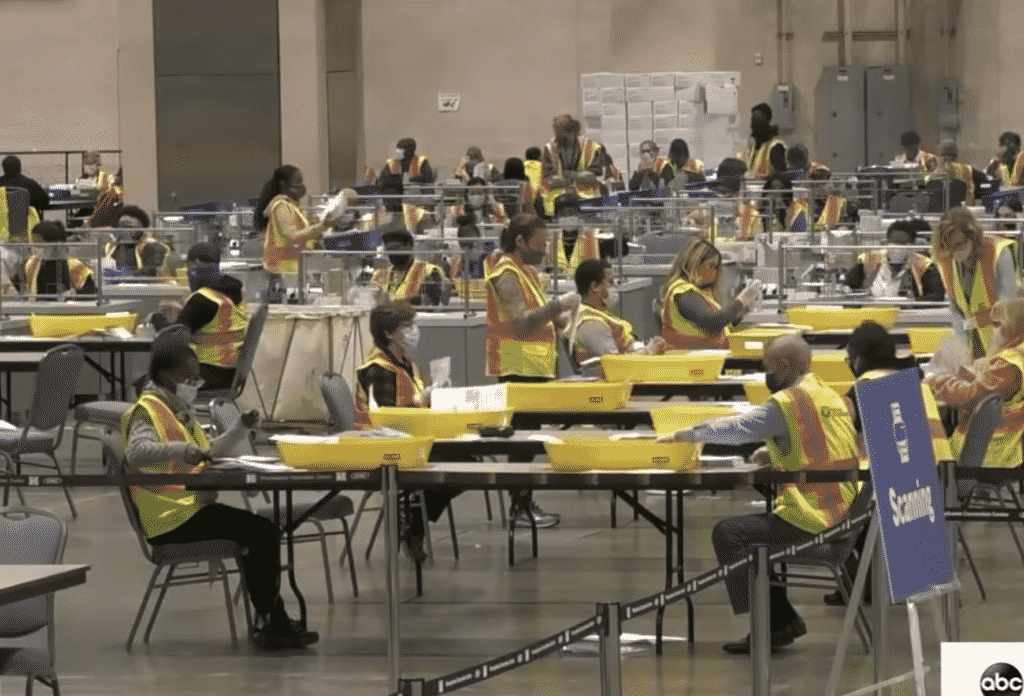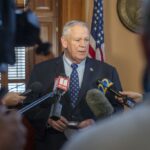During a detailed discussion with The Federalist on Wednesday, representatives from the Georgia Secretary of State’s office provided their perspective on new evidence suggesting more than 10,300 Georgian voters illegally cast ballots in the November 2020 general election.
Last week, The Federalist reported on recently obtained data indicating tens of thousands of Georgia voters had violated Section 21-2-218 of the state’s election code, which requires residents vote in the county in which they reside, unless they had changed their residence within 30 days of the election.
Shortly after the November 2020 election, Mark Davis, the president of Data Productions Inc. and an expert in voter data analytics and residency issues, determined from National Change of Address records that nearly 35,000 Georgia voters who indicated they had moved from one Georgia county to another voted in the 2020 general election in the county from which they had moved.
Kurt Hilbert, one of President Trump’s lead attorneys in the Georgia case, told The Federalist that this category of potentially illegal votes served as one of the 33 categories of voting irregularities underlying the president’s challenge to the Georgia election results. Specifically, in his 64-page complaint accompanied by thousands of pages of sworn affidavits and expert reports filed against the Georgia Secretary of State in early December last year, Trump alleged the state violated 21-2-218 by allowing “at least 40,279 individuals to vote who had moved across county lines at least 30 days prior to Election Day and who had failed to properly re-register to vote in their new county after moving.” The complaint further alleged that the state “improperly counted these illegal votes in the Contested Election.”
Trump’s claims of violations of Section 21-2-218, as well as the numerous other challenges, however, were never heard, Hilbert told The Federalist, because the chief judge of Fulton County, Chris Brasher, failed to appoint a legally eligible judge to hear the case until a month after the lawsuit was filed, making a trial on the president’s election challenge impossible. Then, after a judge was finally appointed late on December 31, the trial was scheduled for January 8 — two days after Congress would open and certify the Electoral College votes. Given the timing of the hearing, which effectively mooted the case, and the Secretary of State’s Office’s promise to meet with his legal team, Trump dropped his lawsuit challenging Georgia’s election.
That Investigation Continues
As The Federalist reported last week, Davis still continued to research the issue. In May, Davis obtained an updated voter database from the Secretary of State’s Office and “found that, of the approximately 35,000 Georgians who indicated they had moved from one county to another county more than 30 days before the November general election, as of May, more than 10,300 had updated their voter registration information, providing the Secretary of State the exact address they had previously provided to the USPS.” Further, “those same 10,000-plus individuals all also cast ballots in the county in which they had previously lived.”
In May, Davis shared this data with the Secretary of State’s Office, which agreed to launch an investigation into potential violations of Georgia’s election laws. Davis is convinced that the total number of residents who confirm their move was permanent — as opposed to merely students or military members who temporarily relocated — will eventually meet and then exceed President Biden’s margin of victory in Georgia, showing that Trump could have won a challenge to the Georgia election results had a court heard his case.
After the Federalist article ran, the Secretary of State’s Office, which had failed to provide responses to multiple questions posed by The Federalist by publication time, arranged for several staffers to provide background information, as well as providing access to the head investigator Frances Watson.
‘According to the Law’ Is Pretty Clear
The Secretary of State’s Office confirmed that the investigation into the approximately 35,000 residents who moved from one county to another more than 30 days before the election remains ongoing. However, when pushed to confirm the preliminary point — that voters who moved from one county to another county more than 30 days before the November election, but voted in their prior county, had voted illegally under 21-2-218 — an attorney with the Secretary of State’s Office stated the question was not that simple.
Section 21-2-218 must be read in light of 21-2-224, the Georgia officials stressed, and that latter provision, according to the Secretary of State’s Office, requires a clerk to allow electors named on the voter list to deposit their votes in the ballot box. However, Section 21-2-224 on which the Secretary of State’s Office relies, only requires electors be allowed “to deposit their ballots according to the law,” and it is difficult to fathom how that provision could alter the clear mandate of Section 21-2-218 for voters to vote in their county of residence.
It is not for the Secretary of State’s Office to say whether such votes constitute illegal votes, the lawyer stressed, noting in the office’s view that is a question for a Georgia court. The Secretary of State’s Office acknowledged, however, that a court could declare an election void if a candidate established that voters representing the total margin of victory had not been legal voters, although adding that Georgia courts have said that being on a National Change of Address list is not in itself enough to challenge a voter.
On the specifics of the investigation, the Secretary of State’s Office would only say that of the 10,300 voters Davis had identified who later updated their voter registrations, 86 percent identified as having moved counties but then voting in the prior county in person, with only 14 percent casting an absentee ballot. Of those who voted by absentee ballot, about 360 had the absentee ballot sent to their prior address.
Is the State ‘Investigation’ Serious?
Watson, however, would not say what further steps the office was taking to investigate. She also refused to state whether the office would send questionnaires to the more than 10,300 individuals who later updated their voting registration, as the Secretary of State’s Office had done for in its investigation of individuals who moved out of state prior to the November 2020 general election. But following completion of the investigation, the Secretary of State’s Office will present its findings to the state election board, which will determine the appropriate remedy and next steps, including whether prosecution is warranted.
The Secretary of State’s Office also refused to answer whether it had undertaken any investigation into the validity of these votes prior to certifying the election results, telling The Federalist that is not the right question and stressing that the Secretary of State’s Office focuses on rooting out fraud and that its role is not to contest elections.
However, two of President Trump’s attorneys in the Georgia election lawsuit told The Federalist that both before and after the election contest was filed, the Secretary of State’s Office refused all efforts to address this and other illegal categories of voting identified by the president’s legal team and hindered their attempts to contest the election and resolve serious concerns regarding illegal votes cast and counted on November 3, 2020.
Cleta Mitchell, now a senior legal fellow for election integrity at Conservative Partnership Institute, helped lead the Georgia challenge. She told me “the Georgia secretary of state completely stonewalled every allegation of illegal votes.” “He just kept saying, ‘We have information that disputes these claims,’” Mitchell added, referring to the Secretary of State’s Office, “but he never made that information available.”
The Secretary of State’s Office, however, maintained that the information Trump’s legal team sought was confidential voter information which they were prohibited by law from sharing. In response to Trump’s request to sit down and review the data, the Secretary of State’s Office said it would not sit down with the legal team to show why their data was wrong while the lawsuit was ongoing. Hilbert told me the “Secretary of State’s office stated repeatedly that ‘their data’ (super-secret data) is correct, and the president’s data is incorrect (without showing why or how — and never producing any data comparison).”
“Of course, that conclusion is now proving to be false as new data is vindicating what was alleged,” Hilbert told The Federalist, in reference to Davis’s May 2021 analysis confirming more than 10,300 of the voters updated their voter registrations indicating their move was permanent.
Illegal Voting Happens All the Time, Secretary’s Office Says
While this new evidence indicates more than 10,300 voters illegally cast their ballots in the 2020 election, during the nearly hour-long interview the Secretary of State’s Office stressed that the same issue flagged by Davis had likely occurred in every election since the National Voter Registration Act of 1993 (NVRA) became law and likely also occur in every state. And before the 2020 election, the Secretary of State’s Office noted, Raffensperger lobbied for changes to the NVRA to allow him to update the voter rolls. Earlier this year, in an interview with John Solomon Reports, Raffensperger also blamed that law, which bans voting-list maintenance within 90 days of an election, for preventing him from purging outdated voters during 2020.
In a statement to The Federalist, Raffensperger added that “I’ve been calling for reform of these laws for years. I’m glad Davis, The Federalist, and the Congressional Republicans who could have done something before the November election, are finally listening to my concerns.”
While acknowledging that the 1993 Voter Registration Act prevents list maintenance 90 days before an election, Davis told The Federalist that nothing prevents the Secretary of State’s Office from running the NCOA more frequently then reminding voters that if they moved permanently, they must update their voter registration. “In fact, this will enfranchise voters by ensuring they retain the legal right to vote,” Davis told The Federalist.”
Davis also suggested the Secretary of State’s Office provide the list to county boards of elections so they can ask voters to confirm their residency when they appear to vote. Davis had encouraged Raffensperger to make more frequent use of NCOA processing in a white paper drafted for the Secretary of State shortly after his election.
Passing the Buck
Davis also agreed the Secretary of State’s Office may not have been able to resolve any investigation into illegal voting before certifying the vote, but said they should not have then claimed that data was flawed, since they apparently did not have current NCOA results to back up that claim. Nor should Raffensperger have insisted the problems with illegal voting did not affect the outcome of the election. “Without thoroughly investigating these issues, they have no way of knowing the breadth of the problems,” Davis told The Federalist.
The Secretary of State’s Office countered that rather than looking back now on voters who cast ballots in 2020, challenges should be made before an election. After the election, the Secretary of State’s Office explained, what it has is merely NCOA information indicating a change in county — but no evidence that the move was permanent—and that evidence is offset by the oath voters take when they cast a ballot that they reside in the county.
Before an election, however, the Secretary of State’s Office stressed, under Section 21-2-230 of the Georgia election code, any “elector” (which is the legalese for a voter), in the county may “challenge the right of any other elector of the county or municipality, whose name appears on the list of electors, to vote in an election.” Then, if there is probable cause to believe a voter no longer lives in a county, a hearing must be held and a decision made following that hearing, which could include a finding that the voter no longer resides in the county and thus cannot vote in that county.
Fulton County, Again
The irony here is that before the November 2020 general election, Georgia voters attempted to do just that, presenting Fulton County officials in July of 2020 a list of 16,000 voters on the voting roll for the county who no longer lived in the county. Ray Smith III, who represented the state House caucus in these efforts, told me that at first the county ignored the request and then officials claimed they were too busy to address the challenges before the election.
Smith then filed suit against Fulton County, and presented the court with evidence establishing the registered voters had permanently moved, including, among other things, affidavits from the current residents at the addresses of the registered voters that attested, under oath, the person registered to vote at that address did not live there. But in September of 2020, the judge who heard the case ruled it was too close to the election to resolve the challenges.
Unfortunately, “once early voting began, we saw some of these same voters we had challenged begin casting ballots in Georgia, even though they no longer lived in the state, were not students, and we had clear evidence they had a permanent address in another state,” Smith told me.
Then, after the general election and before the January 2021 Senate run-off election, additional Georgia voters attempted to challenge individuals listed on county voting rolls who had moved more than 30 days before the scheduled election, pursuant to Section 21-2-230. However, most Georgia counties that received challenges refused to address those challenges, while two counties that did move forward on the challenges, Ben Hill County and Muscogee County, were sued by Majority Forward.
Democrats Fight Election Integrity Efforts
Majority Forward, a Democratic Party-aligned group dedicated to voter registration and voter turnout operations, sued those Georgia counties claiming addressing voter challenges under Section 21-2-230 violated the federal National Voter Registration Act. Federal judge Leslie A. Gardner — the sister of Georgia Democrat Stacey Abrams — denied Majority Forward and the various individual voters’ motion for a preliminary injunction in Ben Hill County, but granted in part, a preliminary injunction against Muscogee County, enjoining the removal of voters from the rolls.
Fair Fight, Inc.—the organization established by Democrat Stacey Abrams in 2014—also attempted to preempt pre-election challenges to determine the legal status of voters by suing True the Vote as well as Mark Davis and several other individuals. Fair Fight’s lawsuit claimed that by challenging the right of electors to vote in a specific county, the defendants had violated Section 11 of the Voting Rights Act, which makes it illegal to “harass or intimidate voters.”
While a federal court denied Fair Fight, Inc.’s motion for a preliminary injunction before the January 2021 run-off election, finding that Fair Fight, Inc. had not established a strong likelihood of success on the merits, the court stressed that “this case is not yet over.” Presiding federal Judge Steve Jones, a Barack Obama appointee, added that the “eleventh-hour challenge to the franchise of more than 360,000 Georgians is suspect. So too is the manner in which Defendants mounted their challenges. The Court will not abide attempts to sidestep federal law to disenfranchise voters. Nor will it tolerate actors brandishing these voter challenges to intimidate and diminish the franchise, for such acts diminish democracy itself.”
What Judge Jones ignored, however, is the reality that every illegal voter disenfranchises a legal voter. And what Republicans ignore is the reality that right now Democrats and their partners in the press — under the guise of protecting the right to vote — are poised to push through H.R. 1, which will gut the currently existing, and woefully inadequate, laws that provide a minimal level of protection to voting integrity.
So, yes, we need to revisit the Georgia election to show the problem with illegal votes. And yes, Raffensperger should not have proclaimed after the November 2020 election that there were not enough illegal votes to affect the presidential election’s outcome. Trump also should not have exaggerated the extent of voter fraud, which now makes it more difficult for the public to learn the evidence of illegal voting.
At this point, however, what matters is that the truth is exposed and that Republicans come together to ensure the integrity of future elections — and expose the Democrats’ attempts to disenfranchise legal voters with illegal and fraudulent votes.






